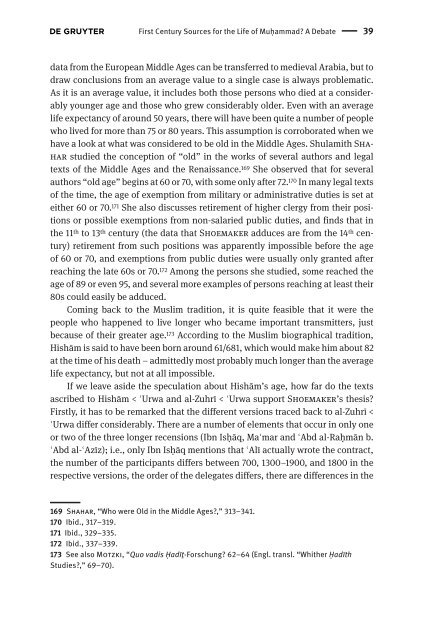0021-1818_islam_98-1-2-i-259
0021-1818_islam_98-1-2-i-259
0021-1818_islam_98-1-2-i-259
You also want an ePaper? Increase the reach of your titles
YUMPU automatically turns print PDFs into web optimized ePapers that Google loves.
First Century Sources for the Life of Mu1ammad? A Debate 39<br />
data from the European Middle Ages can be transferred to medieval Arabia, but to<br />
draw conclusions from an average value to a single case is always problematic.<br />
As it is an average value, it includes both those persons who died at a considerably<br />
younger age and those who grew considerably older. Even with an average<br />
life expectancy of around 50 years, there will have been quite a number of people<br />
who lived for more than 75 or 80 years. This assumption is corroborated when we<br />
have a look at what was considered to be old in the Middle Ages. Shulamith Shahar<br />
studied the conception of “old” in the works of several authors and legal<br />
texts of the Middle Ages and the Renaissance. 169 She observed that for several<br />
authors “old age” begins at 60 or 70, with some only after 72. 170 In many legal texts<br />
of the time, the age of exemption from military or administrative duties is set at<br />
either 60 or 70. 171 She also discusses retirement of higher clergy from their positions<br />
or possible exemptions from non-salaried public duties, and finds that in<br />
the 11 th to 13 th century (the data that Shoemaker adduces are from the 14 th century)<br />
retirement from such positions was apparently impossible before the age<br />
of 60 or 70, and exemptions from public duties were usually only granted after<br />
reaching the late 60s or 70. 172 Among the persons she studied, some reached the<br />
age of 89 or even 95, and several more examples of persons reaching at least their<br />
80s could easily be adduced.<br />
Coming back to the Muslim tradition, it is quite feasible that it were the<br />
people who happened to live longer who became important transmitters, just<br />
because of their greater age. 173 According to the Muslim biographical tradition,<br />
Hisham is said to have been born around 61/681, which would make him about 82<br />
at the time of his death – admittedly most probably much longer than the average<br />
life expectancy, but not at all impossible.<br />
If we leave aside the speculation about Hisham’s age, how far do the texts<br />
ascribed to Hisham < ^Urwa and al-Zuhr\ < ^Urwa support Shoemaker’s thesis?<br />
Firstly, it has to be remarked that the different versions traced back to al-Zuhr\ <<br />
^Urwa differ considerably. There are a number of elements that occur in only one<br />
or two of the three longer recensions (Ibn Is1aq, Ma^mar and ^Abd al-Ra1man b.<br />
^Abd al-^Az\z); i.e., only Ibn Is1aq mentions that ^Al\ actually wrote the contract,<br />
the number of the participants differs between 700, 1300–1900, and 1800 in the<br />
respective versions, the order of the delegates differs, there are differences in the<br />
169 Shahar, “Who were Old in the Middle Ages?,” 313–341.<br />
170 Ibid., 317–319.<br />
171 Ibid., 329–335.<br />
172 Ibid., 337–339.<br />
173 See also Motzki, “Quo vadis Hadi©-Forschung? 62–64 (Engl. transl. “Whither Hadith<br />
Studies?,” 69–70).


